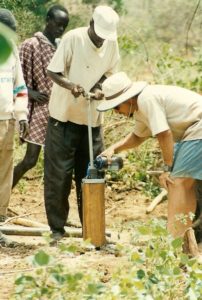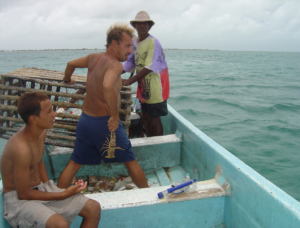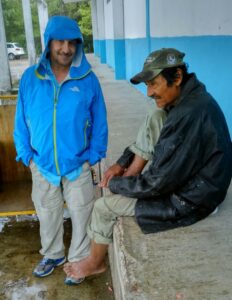Robby Thigpen and the Vision of Marine Conservation Without Borders
 Robby Thigpen’s journey in marine conservation began in the early 1980s when he worked as a commercial fisherman in South Carolina. His experiences at sea, coupled with a deepening concern for marine ecosystems, inspired a lifelong commitment to sustainable fisheries. After traveling extensively through east Africa in the 1990s, Robby returned to the classroom in the early-2000s, formally studying marine biology, ecology, and anthropology at Appalachian State University.
Robby Thigpen’s journey in marine conservation began in the early 1980s when he worked as a commercial fisherman in South Carolina. His experiences at sea, coupled with a deepening concern for marine ecosystems, inspired a lifelong commitment to sustainable fisheries. After traveling extensively through east Africa in the 1990s, Robby returned to the classroom in the early-2000s, formally studying marine biology, ecology, and anthropology at Appalachian State University.
It was during this period that Robby began preparing for what would become his first of many fisheries-focused projects in the Caribbean. Through extensive conversations and correspondence with collaborators, an early project took shape — an internship to study the Indigenous lobster fishery in Belize. Unbeknownst to those involved at the time, this effort laid the foundation for a long-term partnership centered on locally grounded marine conservation, shaped by culturally and linguistically relevant education.
From Fisheries to Biocultural Education
What began as a fisheries research initiative quickly evolved. As Robby engaged with Indigenous and Creole fishing communities, he recognized that meaningful  conservation could not be achieved without integrating local ecological knowledge and languages into the broader conversation about sustainability. This insight would later be formalized in his Hybridization Hypothesis of Ecological Knowledge Systems—an innovative framework for blending Western science with Indigenous and Creole ecological knowledge systems to foster community-centered conservation solutions.
conservation could not be achieved without integrating local ecological knowledge and languages into the broader conversation about sustainability. This insight would later be formalized in his Hybridization Hypothesis of Ecological Knowledge Systems—an innovative framework for blending Western science with Indigenous and Creole ecological knowledge systems to foster community-centered conservation solutions.
Biocultural constants, a cornerstone of Robby’s hypothesis, refer to shared ecological and cultural knowledge that persist across communities and landscapes, such as common understandings of species like jaguars, howler monkeys, conches and spiny lobsters, or concerns about invasive species like lionfish or plecos. These biocultural constants provide common ground for cross-cultural and interdisciplinary conservation.
The Birth of Treasures of the Caribbean and Marine Conservation Without Borders
About five years into this journey, Robby envisioned what would become Treasures of the Caribbean, a series of educational resources aimed at promoting marine and eventually terrestrial conservation through culturally meaningful and linguistically inclusive materials. Recognizing that this work required a global, interdisciplinary network, Robby reached out across his expanding network of Indigenous leaders, scientists, artists, linguists, educators, and fishers. From this growing community of collaborators, Robby founded Marine Conservation Without Borders (MCB), an organization dedicated to biocultural conservation—integrating conservation, culture, and language to empower communities to steward their own ecosystems.
 Innovating Educational Models: Ethnotranslation and STEM Plus
Innovating Educational Models: Ethnotranslation and STEM Plus
One of Robby’s most groundbreaking contributions is the development of ethnotranslation—a method that goes beyond simple translation, adapting scientific concepts to fit local linguistic frameworks and ecological knowledge. This method ensures that STEM education is delivered in a way that resonates with the cultural and ecological realities of the communities served, empowering Indigenous youth to engage with science without sacrificing their identity or language.
Under Robby’s leadership, MCB has developed STEM Plus curricula—educational materials that merge science, technology, engineering, and math with local Indigenous knowledge and biocultural constants. These materials have been successfully piloted in Indigenous primary schools in Quintana Roo, Mexico, and are the first known science resources written in Maya Yucateco and other Indigenous languages for formal classroom use.
These curricula, which are culturally and linguistically grounded, outperform conventional STEM resources and have been shown to improve student engagement, language retention, and environmental awareness (Poot Cahun, in press).
Growing Impact: University-Level Courses and International Collaboration
Beyond primary education, Robby and MCB are taking the first steps to develop formal university-level courses based on this model. In 2024, one of their multi-chapter books was adopted in three universities across two countries and used in disciplines ranging from applied linguistics to teacher training in science education. Importantly, these are the first instances of Maya being used to teach university-level science courses (Thigpen et al., in press).
These materials are part of a broader effort to rebuild fisheries and coastal management from a community-first perspective, incorporating both traditional knowledge and Western science, ensuring that conservation is not just imposed on, but instead owned and led by the communities most impacted.
Community-Driven Development and Partnerships
From the start, Robby has emphasized collaboration and community authorship. Anyone contributing to a chapter or educational material—whether through writing, reviewing, or providing images—is acknowledged as a co-author, editor or contributor. This community-first approach is a defining feature of MCB’s work and reflects a deep respect for the knowledge and contributions of local experts.
For example, Robby is currently working on a chapter for the Belizean Studies Program, developed at a Standard 4 level, focusing on the Maya Forest Corridor rather than lobster fishery study, as many expected. This shift reflects lessons learned from earlier prototypes, as the new materials are far more culturally attuned and distinct from previous iterations.
A Vision for Inclusive Conservation and Education
At MCB, we believe that conservation must be community-led, culturally relevant, and linguistically inclusive. This means supporting local livelihoods and lifeways, promoting environmental sustainability, and ensuring that educational content reflects the languages, values, and knowledge of the communities we serve.
As Robby often emphasizes, the goal is not just to conserve species and ecosystems, but to protect the deep relationships between people and the places they call home.
Looking Ahead: How You Can Help
MCB’s work has grown from a sea-grassroots effort into a movement for biocultural conservation, but it remains largely fueled by Robby’s dedication, personal resources, and the generosity of collaborators worldwide.
If you are moved by this work, we welcome your donations to help sustain and grow these efforts. If a financial contribution isn’t possible, sharing our story and helping to connect us with others who care about linguistic diversity, education, and conservation is equally powerful.
Together, we can support a vision of linguistically and culturally relevant biocultural conservation—a truly democratic sustainability, led by, of, and for Indigenous communities.
